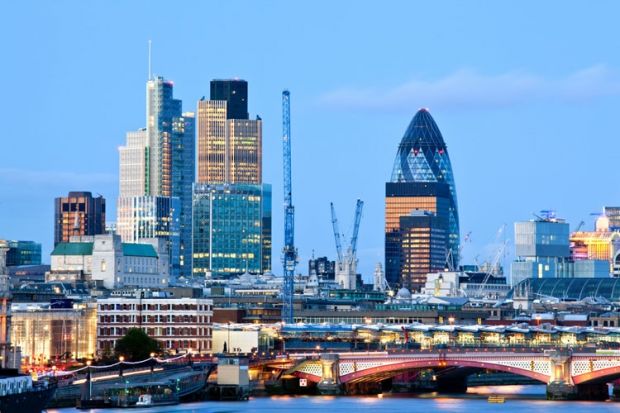London, we are often told, is the world’s greatest city. Rich in diversity, an economic powerhouse, home to dozens of world-famous higher education institutions – little wonder it’s so popular with students from around the world (mayor Boris Johnson is fond of saying that there are more Chinese students in London than in any other city in the world – outside China).
But what’s it like for academics? A recent analysis of data from the Times Higher Education Best University Workplace Survey 2015 (and if you work in UK higher education you can click here to take part in the 2016 survey) suggests that for scholars, London may not be a city paved with gold.
The survey results suggest that employees at London universities have significantly lower job satisfaction scores than those located in almost every other region of the country: just 42 per cent of staff at London universities say that they would recommend working at their university, compared with 74 per cent of those working in the northeast of England.
Here, in an analysis posted in response to the findings, David Bignell, emeritus professor of zoology at Queen Mary University of London, reflects on what makes London a special case – whether it’s for good, bad or ugly.
Academic London: a 'fragile flower' in need of nurturing

“It helps to be brought up a Londoner (as I was). Then at least you don’t feel you’re in an alien land, even if you sometimes fear the city is being overwhelmed by alien cultures. But these have come and gone over the centuries, or been assimilated.
“Nevertheless I groaned inwardly when a happy and successful postdoc in a rural idyll (Exeter) brought me, in 1980, the reward of a lectureship in “The Smoke”, as the capital used to be somewhat unfairly known (Westfield, then Queen Mary).
“To my surprise, the academic environment in the smaller colleges of the great octopus (the University of London) was relaxed and friendly. Nobody thought the worst if you compressed your teaching and administration into three days a week, and stayed at home the other two days to focus on writing. In fact it was largely the norm.
“Better than this, London was still the focus of so much of the UK’s academic life that interaction and stimulus was in abundance, and travel to other places at home and abroad just that little bit easier.
“This all added up to productivity without pressure, and the commute was useful for tutorial marking and flicking through the pages of Current Contents. Even walking over London Bridge each day stirred the patriot in me just enough to dull the stress of the rush hour.
“The downside was, as ever, the cost of living set against academic pay; for much of my early career my salary matched the earnings of a London bus driver, and on promotion to senior lecturer equalled those of the Tube drivers who brought me to work.
“There were no frills, but one subtle (and unspoken) advantage was that you couldn’t socialise with your colleagues outside the workplace, or return to the lab after dinner or at weekends, paradoxically making your world a little wider and less obsessive.
“How much advantage remains in being an academic in London? One suspects the financial stress is the same, or worse. Where once you could have a reasonable family life if your partner was a teacher, secretary or nurse, now it seems you need an accountant, doctor or City slicker.
“But viewed overall, the academic buzz in London is as loud as ever. Are not Imperial College London, University College London and King’s College London world-class, driven by their aggressive target-setting? And Queen Mary not the ninth best in the UK? And St Pancras not the runaway choice for the Francis Crick Institute?
“And our city the cultural hub of the world? How can we fail? But as the small-college ethos dies, colleagues still working complain of being overwhelmed by multiple agendas and targets, the one fatal feeling that can turn London from an opportunity to a hellhole.
“Of all things that shouldn’t be threatened the most important is the personal space we were once allowed to find our individual ways of coping with the capital. Beware: London’s academic prowess is a delicate flower and needs special treatment.”
Take part in the Times Higher Education Best University Workplace Survey 2016
Register to continue
Why register?
- Registration is free and only takes a moment
- Once registered, you can read 3 articles a month
- Sign up for our newsletter
Subscribe
Or subscribe for unlimited access to:
- Unlimited access to news, views, insights & reviews
- Digital editions
- Digital access to THE’s university and college rankings analysis
Already registered or a current subscriber? Login


